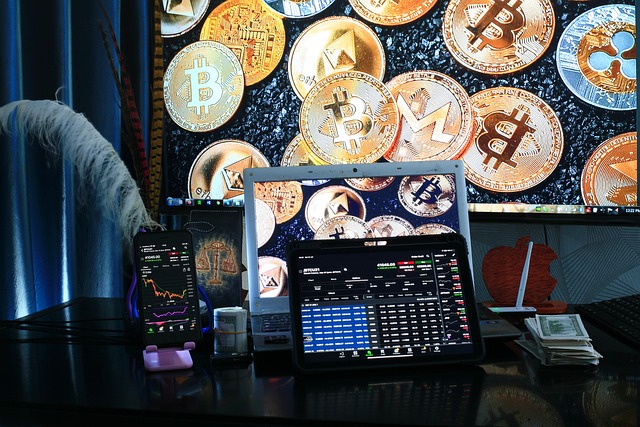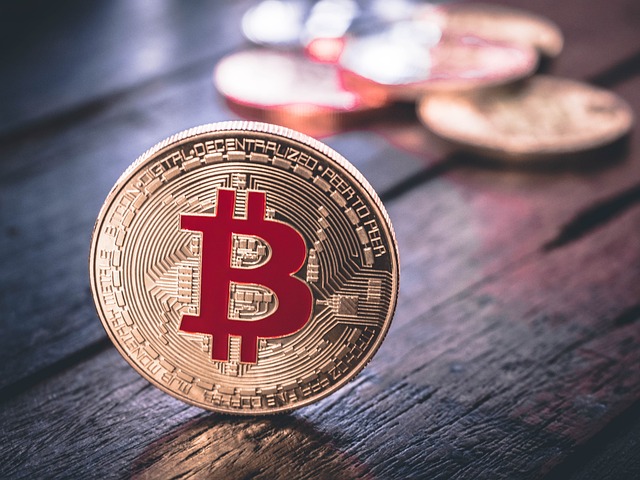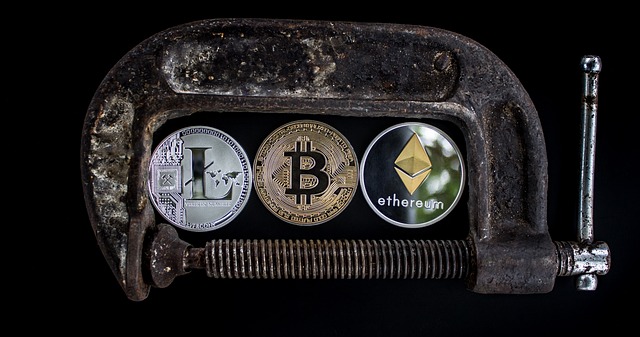Decentralized Finance Benefits for a Brighter Financial Future
Decentralized Finance Benefits for a Brighter Financial Future

The Rise of a New Financial Paradigm: Exploring the Potential of Decentralized Finance
Decentralized finance, also known as DeFi, is a revolutionary movement that is transforming the traditional financial landscape. Unlike traditional finance, which relies on centralized institutions such as banks and governments, DeFi operates on a decentralized network powered by blockchain technology.

One of the key advantages of decentralized finance is the ability to break free from traditional institutions. With DeFi, individuals no longer need to rely on banks or other intermediaries to manage their finances. Instead, they can interact directly with the decentralized network, gaining instant access to a wide range of financial services.

Breaking Free from Traditional Institutions: How Decentralized Finance Empowers Individuals
Traditional financial institutions have long held a monopoly over the control and distribution of financial resources. Decentralized finance (DeFi), however, is rapidly disrupting this dominant paradigm by offering a new way for individuals to regain control of their financial lives. Unlike traditional institutions that require extensive paperwork, credit checks, and middlemen, DeFi platforms utilize blockchain technology to enable peer-to-peer transactions and data transparency. This shift towards decentralized finance empowers individuals by removing barriers to entry, reducing costs, and providing greater accessibility to financial resources.
One of the primary ways decentralized finance empowers individuals is by eliminating the need for intermediaries. Traditional financial institutions often act as gatekeepers, requiring individuals to meet certain criteria and go through a lengthy approval process before gaining access to financial services. This can be especially challenging for those who are unbanked or underbanked, as they have limited options and face higher barriers to entry. In contrast, DeFi platforms operate on a decentralized network, allowing individuals to directly interact with financial services and products without the need for an intermediary. This not only promotes financial inclusion but also increases financial agency, enabling individuals to take control of their own financial destiny.
Embracing Financial Inclusion: How Decentralized Finance Opens Doors for the Unbanked
Decentralized finance, also known as DeFi, has emerged as a revolutionary force in the financial world, particularly when it comes to embracing financial inclusion and empowering the unbanked. Traditional banking systems have long excluded a significant portion of the global population, particularly those in underprivileged communities or remote regions. However, with the advent of DeFi, this is changing rapidly.
One of the key ways in which decentralized finance opens doors for the unbanked is by removing the need for intermediaries or middlemen. In traditional financial systems, individuals without access to banks or other financial institutions are often left with limited options and subjected to high fees for basic transactions. However, DeFi platforms powered by blockchain technology eliminate the need for intermediaries, enabling direct peer-to-peer transactions. This not only reduces costs but also provides greater accessibility and control over their finances for the unbanked population.

Cutting Out the Middleman: The Cost-Saving Advantages of Decentralized Finance
Decentralized finance, also known as DeFi, is revolutionizing the financial landscape by eliminating the need for intermediaries. Traditionally, financial transactions require trusted third parties like banks, payment processors, and brokers to facilitate the exchange of funds. However, with decentralized finance, individuals can directly transact with one another on a peer-to-peer basis, cutting out these middlemen. This bypassing of intermediaries brings about significant cost-saving advantages for users.
One of the major cost-saving advantages of decentralized finance is the elimination of excessive fees. Traditional financial institutions often charge hefty fees for their services, cutting into individuals’ profits and making financial transactions more expensive. In contrast, decentralized finance leverages smart contracts and blockchain technology to automate transactions without the need for intermediaries. This automation reduces overhead costs and eliminates the need for intermediaries to charge significant fees. As a result, individuals can enjoy lower transaction costs and retain a larger portion of their funds. Whether it’s sending money across borders or investing in assets, decentralized finance offers a cost-effective alternative to traditional financial systems.
Enhancing Transparency and Security: How Blockchain Technology Benefits Decentralized Finance
Transparency and security are vital pillars in the world of finance, and blockchain technology has emerged as a game-changer in this regard. With its decentralized nature and incorruptible record-keeping capabilities, blockchain ensures that all transactions carried out on a decentralized finance (DeFi) platform are transparent and cannot be altered or tampered with. This means that every financial transaction, whether it be lending, borrowing, or trading, can be traced and verified by anyone on the blockchain network.
Moreover, blockchain technology enhances security by eliminating the need for intermediaries and central authorities. Traditional financial systems often rely on banks or other institutions to act as intermediaries, which can leave room for human error, fraud, or abuse. In contrast, DeFi platforms leverage blockchain’s cryptographic algorithms to secure transactions and protect user data. Each transaction is encrypted and validated by network participants, ensuring that only authorized individuals can access and manipulate the information. This level of security not only safeguards user funds but also promotes trust and confidence in the decentralized finance ecosystem.
Investing in a Global Economy: How Decentralized Finance Enables Borderless Transactions
Decentralized finance, or DeFi, has revolutionized the way individuals and businesses invest in a global economy. By leveraging blockchain technology, DeFi allows for borderless transactions that transcend traditional financial systems. This means that anyone, regardless of their location or background, can participate in the global economy and access investment opportunities that were once exclusive to a select few.
One of the key advantages of decentralized finance in enabling borderless transactions is the removal of intermediaries. In traditional financial systems, transactions often involve multiple parties, such as banks or payment processors, which can slow down the process and introduce unnecessary fees. With DeFi, transactions are executed directly between individuals or businesses, cutting out the middleman and reducing costs. This not only allows for faster and more cost-effective transactions but also promotes financial inclusivity, as individuals who were previously excluded from traditional financial systems can now actively engage in the global economy.
In conclusion, decentralized finance has opened up new possibilities for investing in a global economy. By enabling borderless transactions and eliminating the need for intermediaries, DeFi has significantly reduced barriers to entry and empowered individuals from all corners of the world to participate in the global financial landscape. As the potential impact of DeFi continues to unfold, it is exciting to envision a future where individuals have equal access to investment opportunities, regardless of their geographical location or socioeconomic status.
• DeFi allows for borderless transactions that transcend traditional financial systems
• Anyone, regardless of their location or background, can participate in the global economy
• Access to investment opportunities that were once exclusive to a select few is now open to all
• Decentralized finance removes intermediaries from transactions, speeding up the process and reducing fees
• Transactions are executed directly between individuals or businesses in DeFi
• Faster and more cost-effective transactions promote financial inclusivity
• Individuals who were previously excluded from traditional financial systems can now actively engage in the global economy
• DeFi has significantly reduced barriers to entry for investing in a global economy
• Empowers individuals from all corners of the world to participate in the global financial landscape
• Exciting future where individuals have equal access to investment opportunities regardless of their geographical location or socioeconomic status.
Empowering Innovation: How Decentralized Finance Sparks Entrepreneurial Growth
Decentralized finance, or DeFi, has emerged as a catalyst for sparking entrepreneurial growth in our increasingly digital world. By removing the need for intermediaries like banks and traditional financial institutions, DeFi offers entrepreneurs a more accessible and streamlined way to access capital and create innovative solutions. With DeFi, entrepreneurs can navigate the often complex and bureaucratic processes of traditional finance, allowing for more efficient fundraising and project development.
One of the key advantages of DeFi for entrepreneurs is the ability to access a global pool of investors and contributors. By leveraging blockchain technology, DeFi platforms enable borderless transactions and investment opportunities. This global reach opens up doors for entrepreneurs to connect with potential investors and collaborators from around the world, fostering greater creativity and cross-pollination of ideas. Additionally, DeFi platforms often embrace open-source principles, allowing entrepreneurs to build upon existing protocols and access a wealth of resources and tools that empower innovation and drive growth.
Navigating the Risks: Understanding the Challenges of Decentralized Finance
Decentralized finance, or DeFi, is undoubtedly gaining momentum as a financial paradigm that offers exciting opportunities. However, it’s vital to understand that, like any emerging technology, DeFi is not without its challenges. One of the primary concerns revolves around the security and vulnerability of the decentralized platforms that power DeFi.
The absence of centralized intermediaries means that individuals are solely responsible for safeguarding their assets and navigating potential risks. While this empowers users with greater control, it also puts them at a higher risk of falling victim to scams, hacking attempts, or unregulated projects. Moreover, the evolving nature of DeFi poses a challenge in terms of regulatory compliance and investor protection. As the industry continues to innovate and scale, it becomes crucial to establish robust safeguards and proactive measures to mitigate these risks effectively.
Democratizing Access to Capital: How Decentralized Finance Supports Crowdfunding
Decentralized finance, also known as DeFi, is revolutionizing the way people access capital for their projects through crowdfunding. Traditional financial institutions have long held the power to decide who gets funding and who does not. This centralized model has often left many individuals, particularly those without a robust network or established credit history, unable to secure the financial support they need to turn their ideas into realities.
With the advent of decentralized finance, crowdfunding has become more accessible to the masses. Through blockchain technology, individuals can now bypass intermediaries and directly connect with potential investors from around the world. This open and transparent system allows innovators to present their ideas to a global audience and receive funding from individuals who believe in their vision. By removing the barriers imposed by traditional institutions, decentralized finance levels the playing field and empowers entrepreneurs, artists, and creators to access the capital they need to bring their dreams to life.
The Future is Here: Exploring the Potential Impact of Decentralized Finance on Traditional Financial Systems
Decentralized finance, also known as DeFi, has emerged as a disruptive force in the financial industry. By leveraging blockchain technology, DeFi offers a decentralized and open-source alternative to traditional financial systems. This paradigm shift has the potential to transform the way we conduct financial transactions and interact with the global economy.
One of the key impacts of decentralized finance on traditional financial systems is the disintermediation of intermediaries. In traditional finance, banks and other financial institutions act as intermediaries, facilitating transactions and charging fees for their services. With decentralized finance, these intermediaries are bypassed, allowing individuals to transact directly with each other. This not only eliminates the need for costly middlemen but also introduces a level of transparency and security through smart contracts on the blockchain. As a result, decentralized finance has the potential to make financial services more accessible, efficient, and cost-effective for individuals and businesses worldwide.
What is decentralized finance?
Decentralized finance, or DeFi, refers to a new financial paradigm that operates on blockchain technology, allowing for peer-to-peer transactions without the need for intermediaries like banks or traditional financial institutions.
How does decentralized finance empower individuals?
Decentralized finance gives individuals more control over their financial decisions. It allows them to manage their own funds, access financial services without the need for a middleman, and participate in a global economy with ease.
How does decentralized finance benefit the unbanked?
Decentralized finance opens doors for the unbanked by providing them with access to financial services. It eliminates the need for a traditional banking infrastructure, making it easier for the unbanked to store, transfer, and borrow money.
What are the cost-saving advantages of decentralized finance?
Decentralized finance cuts out middlemen, reducing transaction costs and eliminating unnecessary fees. This not only saves individuals money but also makes financial services more accessible to those who cannot afford traditional banking fees.
How does blockchain technology enhance transparency and security in decentralized finance?
Blockchain technology, the underlying technology behind decentralized finance, provides a transparent and immutable record of all transactions. This ensures that all financial activities can be verified and eliminates the risk of fraud or tampering.
Can decentralized finance enable borderless transactions?
Yes, decentralized finance allows for borderless transactions. By operating on a global network, individuals can send and receive funds anywhere in the world without the need for traditional banking systems or currency exchange.
How does decentralized finance support entrepreneurial growth?
Decentralized finance empowers innovation by providing entrepreneurs with access to capital through crowdfunding and decentralized fundraising platforms. This enables startups and innovative projects to secure funding and bring their ideas to life.
What are the risks associated with decentralized finance?
While decentralized finance offers numerous benefits, it also comes with risks. These include smart contract vulnerabilities, regulatory uncertainties, and potential for market manipulation. It’s important for users to understand and navigate these risks.
How does decentralized finance support crowdfunding?
Decentralized finance supports crowdfunding by enabling individuals to pool their funds together and invest in projects or initiatives they believe in. This democratizes access to capital and allows for a more inclusive and diverse funding ecosystem.
What is the potential impact of decentralized finance on traditional financial systems?
The future of decentralized finance has the potential to revolutionize traditional financial systems. It could disrupt the power dynamics of traditional institutions, promote financial inclusion, and empower individuals to have more control over their financial lives.
Todays Featured Product:
Buy, exchange and grow your crypto securely with a Ledger hardware wallet, combined with the Ledger Live app. It’s never been easier to keep your crypto safe and accessible. Buy direct from Ledger.com and get todays Special Offers Here.




